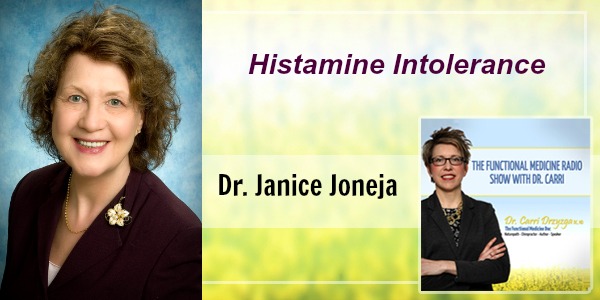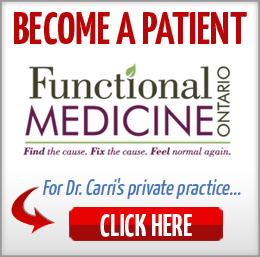Podcast: Play in new window | Download
Subscribe: Apple Podcasts | Android | RSS
In this episode of The Functional Medicine Radio Show, Dr. Carri’s special guest Dr. Janice Joneja talks about histamine intolerance.
Dr. Janice Joneja holds a Ph.D. in medical microbiology and immunology. She is a registered dietitian in Canada and a member of the Academy of Nutrition and Dietetics in the USA. She has held faculty positions at several universities, including the University of British Columbia. For 13 years she was head of the Allergy Nutrition Clinic at the Vancouver Hospital and Health Sciences Centre.
She is also the author of eight books and dietetic practice manuals on food allergy. Her work has been published in peer-reviewed scientific and medical journals, as well as in popular magazines. She is a respected lecturer at universities, colleges and hospitals internationally, and regularly appears on television and radio call-in shows as an expert in her field.
Main Questions Asked about Histamine Intolerance:
- What is histamine?
- What is histamine intolerance?
- What are some of the symptoms that indicate histamine intolerance?
- What really causes histamine intolerance?
- Does histamine intolerance improve?
- Where can we find accurate information about histamine intolerance?
Key Points Made by Dr. Janice about Histamine Intolerance:
- Histamine is an important chemical within the body that protects the body when it is under threat, assists in digestion and other functions.
- The symptoms of allergy are principally due to an excess of histamine in the body.
- Histamine intolerance (HI) is the body’s inability to handle and mitigate its histamine levels. This often makes a person assume they are having an allergic reaction to something when that isn’t the case.
- HI symptoms include: itching, swelling, a drop in blood pressure, a heightened heart rate that can lead to feelings of an anxiety attack, runny eyes and nose, headaches, fatigue, confusion, loss of consciousness, heartburn, and reflux.
- Some people can’t produce enough of the enzyme that breaks down excess histamine – this can possibly be genetic.
- Some people produce too much histamine in response to normal circumstances.
- Chronic inflammatory infections can also lead to HI.
- Certain foods will also contribute to an increase in histamine level. Examples include: fermented foods like cheese and yogurt, overripe vegetables, certain fruits, fish, shellfish, and certain food additives like sulfites.
- It can be difficult to diagnose HI because of the variety of potential symptoms. You have to rule out the underlying factors first.
- The best place to start is to go to your doctor to rule out some potential causes of their symptoms, and from there try a low histamine diet.
- Depending on the root cause of a person’s histamine excess, the intolerance may be something that can be dealt with or it could be a long standing condition.
- Women going through hormone fluctuations can also trigger the symptoms associated with HI.
- The most important thing in accessing information about HI is to go to an expert source that has been working in the field for a number of years.
Resources Mentioned for Histamine Intolerance:
More info on histamine intolerance
Book – Reclaim Your Energy and Feel Normal Again
Thank you for listening! If you enjoyed this podcast, please subscribe and leave a 5 star rating and review on iTunes!




